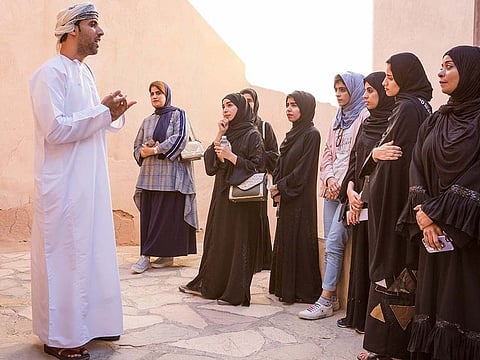More than 853,000 Omanis secure jobs in 2023
Key labour reforms and initiatives position country for continued success

Muscat: More than 853,000 Omanis were employed across the public and private sectors in 2023, marking a 6.4 per cent growth from the previous year.
Oman had created 86,530 job opportunities for its citizens in both public and private sectors from January 2021 to December 2022, according to the Oman Vision 2040 Implementation and Follow-up Unit’s annual report.
Expatriates also accounted for 1.8 million workers, with a 7 per cent increase. These figures highlight the impact of ongoing reforms and strategic initiatives aimed at boosting national workforce participation and aligning the labour market with the country’s long-term economic goals.
Key labour reforms and initiatives have positioned the country for continued success, making the labour market more attractive to national talent and addressing the evolving needs of the private sector.
Also Read: Oman imposes income tax on high earners
New labour law
Central to these reforms was the issuance of the new Labour Law in accordance with Royal Decree No. 53/2023, aimed at improving worker conditions, enhancing productivity, and fostering long-term stability in the labour market.
According to the report, the Omani government has been according high priority to provide employment opportunities to citizens in line with the Oman Vision 2040.
Oman has a diverse economy that relies on several sectors, including oil and gas, financial sector, tourism, construction, and agriculture.
The government has been making efforts to diversify economic activities to create more employment opportunities for citizens. Even though the oil sector remains the mainstay of the Omani economy, other sectors are also supporting employment generation in an increasing manner.
Remote work
The government encouraged adoption of remote work during the pandemic that helped contain the adverse impact on employment conditions.
Besides, the government has been focusing on skill-building through various initiatives so that new employment opportunities in the area of information and technology, and digitalisation could engage Omani citizens.
In 2023, the Ministry of Labour took decisive steps to implement several initiatives that have already had a positive impact on the employment system.
Two notable initiatives focused on enhancing job opportunities in both the private and public sectors.
Long-term strategies
As a result, 13,242 job seekers were appointed in private sector establishments for the first time, while 29,668 individuals were re-appointed through job rotation initiatives.
Furthermore, 17,910 job seekers secured positions within public sector establishments, demonstrating the government’s commitment to creating sustainable employment for Omanis across various industries.
With Oman’s labour market growing rapidly, the Ministry of Labour continues to focus on long-term strategies that prioritise skills development, job creation, and regulatory improvements.
By fostering a balanced and competitive employment landscape, Oman is steadily moving toward achieving its Vision 2040 goals, where both Omani talent and expatriate contributions are essential to the nation’s prosperity.
Meanwhile, Oman has achieved 54 per cent of its 2024 employment targets within the first six months of 2024. 4,074 Omanis have been employed in both the public and private sectors through direct hires or the replacement of expatriates.
The Ministry of Labour introduced the “Sahim” initiative in April 2022 aiming at encouraging jobseekers to utilise their skills, abilities and practical experiences to develop the economy, opening up new visas for investments, and gaining better competitive advantage.
The Sahim initiative has successfully employed 5,000 jobseekers under a temporary contract work system in government agencies in various governorates. Private sector is expected to play a key role in the diversification of economic activities in the Sultanate and generate employment opportunities for both Omani citizens and expatriate workers.
According to data from the National Centre for Statistics and Information, the gross domestic product (GDP) for the first quarter of 2024 increased slightly by 0.8 per cent year-on-year.
-- Fahad Al Mukrashi is a journalist based in Muscat.
Sign up for the Daily Briefing
Get the latest news and updates straight to your inbox



